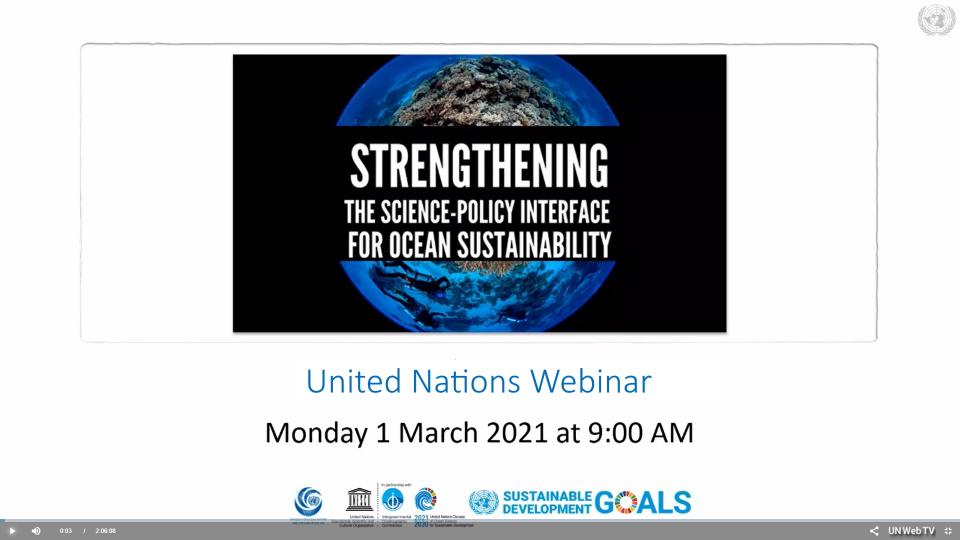From 28 July to 6 August 2025, the Group of Experts for the third cycle of the Regular Process for Global Reporting and Assessment of the State of the Marine Environment, including socioeconomic aspects, are convening at the World Maritime University in Malmö, Sweden hosted by WMU - Sasakawa Global Ocean Institute team to finalize draft 2 of the third World Ocean Assessment.
Webinar
Background
In these challenging times of the COVID-19 pandemic, we are reminded of the importance of the ocean for the health of the people and the planet, and the significant benefits it provides which are critical to sustainable development. However, the ocean and its ecosystems continue to face unprecedented challenges, including impacts by multiple and cumulative pressures from human activities as well as changing dynamics fueled by climate change, leading to the continued deterioration of the health of the ocean.
Addressing such challenges calls for the strengthening of science-policy interface, aimed at increasing the scientific understanding of the ocean and the challenges it faces, while also ensuring responsive ocean policies and actions that are informed by the best available science. Integrating science and policy in a mutually reinforcing manner is crucial to the sustainable development of the ocean and its resources. The strengthening of science-policy interface at the global, regional and national levels should ensure a stronger engagement between scientists, policymakers and society. This should in turn result in the appropriate interaction and uptake of science and policy-relevant knowledge and needs, leading to optimal policy decisions regarding the sustainable management of oceans and their environment.
An important example of current efforts at the global level to strengthen the science-policy interface is the Regular Process for Global Reporting and Assessment of the State of the Marine Environment, including Socioeconomic Aspects (the Regular Process) and the upcoming second world ocean assessment (WOA II), a major output of the second cycle of the Regular Process and the newest outcome of the only integrated assessment of the environmental, economic and social aspects of the world’s ocean at the global level.
Objectives
The objective of this webinar was to raise awareness of the importance of the science-policy interface for ocean governance at all levels, showcase links between the science-policy interface and society including ocean users, and reinforce the understanding of the role of citizen science, as well as traditional, indigenous and local knowledge in strengthening the science-policy interface.
This webinar was held on 1 March 2021 in anticipation of the launch of WOA II, and in connection with the initial phase of the third cycle (2021-2025) of the Regular Process, and of the United Nations Decade of Ocean Science for Sustainable Development (2021-2030) which both started in January 2021. The webinar showcased these two processes and their outputs, and highlighted the synergies which are being identified to support the strengthening of the ocean science-policy interface across disciplines and at all levels.
Format
The webinar included presentations and panel discussions by individuals engaged in the science-policy sphere, including scientists, policy makers, diplomats, and ocean users. They shared views, experience and best practices with regard to the strengthening of the science-policy interface. The recording of the webinar is now available on UN Web TV.
Programme
OPENING
- Miguel de Serpa Soares, Under-Secretary-General for Legal Affairs and United Nations Legal Counsel, UN/OLA
- Juliette Babb-Riley, Co-Chair of the Ad Hoc Working Group of the Whole of the General Assembly on the Regular Process and Deputy Permanent Representative of Barbados to UN
- Vladimir Ryabinin, Executive Secretary of the Intergovernmental Oceanographic Commission (IOC) of UNESCO
PANEL I: Knowledge needs to inform sustainable ocean governance at all levels
- Jacqueline Uku, President of the Western Indian Ocean Marine Science Association
- Jian Liu, Director of the Science Division, United Nations Environment Programme (UNEP)
- David Millar, Fugro, a multinational corporation headquartered in the Netherlands active in the Seabed 2030 Ocean Mapping project (under GEBCO)
- Moderator: Juliette Babb-Riley, Deputy-Permanent Representative of Barbados to the United Nations
- Q&A
PANEL II: Mechanisms to strengthen the science-policy interface at all levels
- Ana María Hernández, Chair of the Intergovernmental Science-Policy Platform on Biodiversity and Ecosystem Services (IPBES)
- Alan Simcock, Joint Coordinator of the Group of Experts for the Regular Process
- Clement Yow Mulalap, Mission of the Federated States of Micronesia to New York
- Moderator: Vladimir Ryabinin, Executive Secretary of the Intergovernmental Oceanographic Commission (IOC) of UNESCO
- Q&A
CLOSING
- Fabien Cousteau, Aquanaut, Oceanographic Explorer, Environmental Advocate and Founder of the Fabien Cousteau Ocean Learning Center


